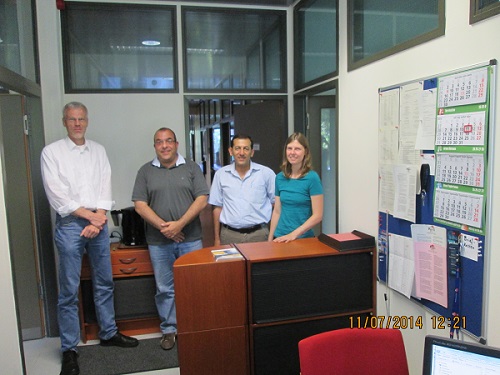Within the TEMPUS MAPEC program a “Train the Trainer” workshop was conducted at the Hamburg University of Technology (TUHH) from the 25th of August till the 29th of August regarding the lecture “Renewable Energies”. Partners from University of Jordan, German Jordanian University, Tishreen University, University of Aleppo and Al-Baath University participated in this week.
Activities
Several different types of activities were part of the workshop. From Monday till Thursday the lectures of the MAPEC course Renewable Energies including the topics Solar Energy, Bioenergy, Hydro Energy, Geothermal Energy and Wind Power were discussed. For the lectures Photovoltaic and Wind Power Prof. Ajib from the Hochschule Ostwestfalen Lippe joined the group as he developed the material. Additionally to the lectures exercises were introduced. These exercises should be calculated by the students on their own or in small groups during a designated time. The PhD students Nils Christiansen, Ulf Neuling, Hannes Wagner and Annika Magdowski presented them. All lecture materials are accessible via the shared Dropbox folder MAPEC/Courses/Kaltschmidt/Renewable Energies.
On Tuesday a meeting between the president and the participants of the workshop was scheduled. Over the years of the MAPEC project good relationships between the TUHH and the Jordanian Universities have been established. At the moment the TUHH is hosting two PhD students from Jordan because of this project.
Prof. Al-Hilal was not only participating in the Train the Trainer workshop he also presented on Thursday his new University the Zirve University in Gaziantep. As part of this workshop he introduced the participants to the renewable energy potential in Turkey.
After four days of presentations and discussions an excursion was made on Friday to different sites related to renewable energies. It started with a visit of the Energy Hill in Hamburg Georgswerder. This is a former landfill where from the 50s till the 70s municipal and hazardous waste was dumped. In the 80s it was discovered that toxic chemicals like dioxins are leaching out into the groundwater. Since then a complex system to avoid leaching has been installed. Nowadays wind power and photovoltaic are installed on this hill. Together with the landfill gas this site shows how old landfills can be maintained and used for renewable energies. The second stop was at the Environmental Agency Hamburg. This new building was opened in 2013 and combined innovative architecture and design with state of the art building services. During the guided tour for example the ventilation system and the temperature control was presented. The last stop was at the Fermentation Plant Bützberg from the Stadtreinigung Hamburg. There most of the municipal biowaste and local garden waste of Hamburg is processed in a dry anaerobic digestion plant. The biogas is cleaned and pure biomethane is fed in the local natural gas grid. The digestate is composted to a valuable product for agriculture and gardening.
The week was completed with two social events on Monday and Thursday evening.
During the five days of the Train the Trainer workshop all participants extended their knowledge about renewable energies. In discussions, presentations and a tour of the plant expert knowledge could be conveyed. Furthermore, the good relationship between the universities could be developed.

Two Weeks Internship Report
June 30 – July 11, 2014
Participant: Samer A. Zawaydeh, Moh'd Kotaiba Abugazleh
The first weeks started with a kick off meeting with the internship program management team. This was followed with a campus walking site tour. Furthermore, within the first week the participants:
- attended lectures in English language (International Waste Resource Management, Biological Waste Management, Hazardous Waste Incineration, Waste and Wastewater System in a Global Context, Shallow Geothermal Energy, Air Pollution Abatement, Waste Recycling Technologies),
- listened to presentations of several PhD students in the institute,
- worked self-dependent on tasks in the field of renewable energy.
The second week contained mostly self-study about issues in the field of wind energy, attending some lectures and a seminar in German language.
The internship was concluded by a written report and presentations about the self-study.
Overall the internship was an excellent opportunity for the participants to learn from experts in Energy, Waste and Environments, and to interact with scientist in the field. It is important to have the global perspective and the local perspective. This had a large value to see the development of renewable energies from the views from International and local practitioners in the field. Systematic approach to developing research in the field was discussed.
TRAIN of TRAINERS IN PORTUGAL – 11TH TO 15TH JANUARY 2015
Between January, 11th and 15th train of trainers was organised in Portugal for Syrian and Jordanian Prtners. From Syria, Prof. Ali Zidan (from Tishreen University) represented the Syrian universities and Prof. Mohammad Hamdan and Ms. Sana’a Aqqad from the University of Jordan represented the Jordanian universities. The program included visits to facilities in areas related to environment. The sites included in the program were:
· IKEA Industry (in Paços de Ferreira) – a furniture company, with an Environmental Management System implemented
· LIPOR II (Moreira da Maia) – an energy Valorisation Center
· ETAR Ponte de Moreira (in Maia) – a waste water treatment plant
· Águas do Douro e Paiva (in Lever) – the main water treatment plant for Porto region
· LIPOR I (in Baguim do Monte) – waste sorting center, organic waste valorisation center, biogas production unit and photovoltaic production plant
The program allowed the participants to visit some state of the art facilities covering a wide range of environmental related areas. The discussion and training with specialists from these organizations allowed the participants to strength their competences in these fields and have an operational perspective of the subjects. All participants agreed that this “Train of Trainers” was a very fruitful experience.
